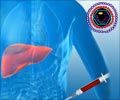There has been a dramatic drop in liver cancer cases among Taiwanese children following the use of hepatitis B vaccine at birth, according to a new study.
There has been a dramatic drop in liver cancer cases among Taiwanese children following the use of hepatitis B vaccine at birth, according to a new study.
In July 1984, a universal vaccination program was initiated among newborn children in Taiwan to prevent the hepatitis B virus infection, which can predispose to the development of hepatocellular carcinoma, a primary malignancy of the liver.In the new study, researchers from National Taiwan University Hospital in Taipei analysed the data from almost 2,000 patients with hepatocellular carcinoma who were aged 6-29 years over a period of 20 years.
Age- and sex-specific incidence were compared among vaccinated and unvaccinated birth cohorts with regression models.
The study showed that 64 cases of hepatocellular carcinoma were found among people vaccinated in almost 38 million person-years compared to 444 cancers among unvaccinated people in almost 80 million person-years.
Among those who developed liver cancer despite the program, the analysis shows that most of these patients, however, were not given enough doses of the vaccine, or were insufficiently protected when they were born to hepatitis B-infected mothers.
"These data suggest that the effectiveness of the universal HBV immunization program to prevent hepatocellular carcinoma has extended beyond childhood and into young adulthood over the past two decades," the authors said.
Advertisement
Source-ANI
SRM















